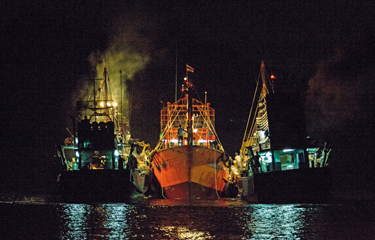EU reissues yellow card to Panama

The European Commission has reissued a yellow card to Panama, warning that it is not doing enough to fight illegal, unreported, and unregulated (IUU) fishing.
The yellow card does not affect trade between the E.U. and Panama, but rather acts as a warning that the E.U. is considering further action, most notably a red card, which would result in a ban of Panamanian seafood products from entering the E.U. market.
The Republic of Panama previously already received a yellow card in November 2012, but it was lifted in October 2014. This is the first time the E.C. has reinstated a yellow card warning on a country that has achieved a lifting of a previous yellow card.
“Today's decision confirms our determination to maintain the fight against IUU high on the European Commission agenda, and to ensure that results achieved under the IUU Regulation are long-lasting ones,” Commissioner for Environment, Maritime Affairs and Fisheries Virginijus Sinkevičius said in a statement. “We hope that Panama[’s] authorities will swiftly step up their efforts and implement the necessary measures to demonstrate their commitment in the fight against IUU fishing. Fighting illegal fishing has been a fundamental part of the E.U.'s action to improve ocean governance over the last 10 years, and this commission will continue our fight against IUU fishing with a zero-tolerance approach.”
The E.C. said the reissuance of the yellow card was a result of “significant backtracking” in Panama’s efforts to “ensure adequate control over the activities of its vessels to prevent and deter them from engaging or supporting IUU fishing.”
“In particular, Panama should ensure an effective monitoring of the activities of its fishing and fishing related vessels and an adequate implementation of its enforcement and sanctioning system. In addition, it should also ensure adequate implementation of the Port State Measures Agreement in order to prevent fish stemming from IUU fishing activities from reaching its market or others, and to deter IUU fishing vessels from receiving port services,” the European Commission said in its release. “An adequate control of the activity of processing plants – especially those exporting to the EU – is of paramount importance.”
The E.C. did not give a deadline for Panama to show improvement.
“The yellow card is a warning and offers Panama the chance to react and take measures to rectify the situation within a reasonable time,” it said.
The Environmental Justice Foundation praised the decision, saying it “sends an important message to all exporting countries that progress on tackling illegal fishing must continue after [a yellow] card is lifted.”
Panama’s original yellow card – a warning that could lead to seafood import bans to the EU – was issued in November 2012 for inadequate monitoring of their fishing fleets or waters, neglecting to impose sanctions on illegal operators, and failing to develop robust fisheries laws.
After it received its first yellow card, Panama introduced legislation that resulted in improvements to monitoring, control, and inspection of fishing activities, according to the EJF. But the reissuance of the E.C. warning is shows that commitment was not sustained, the NGO said.
“The pertinent question remained – does progress continue?” it said. “The lifting of a yellow card does not mean that illegal fishing has been totally eradicated in a country’s waters or within its fleet. It means that the state is showing serious, sincere efforts to deal with the problem – there may still be many issues to deal with.”
EJF Executive Director Steve Trent said it is important the E.C. show previous yellow-card earners it is still monitoring their efforts, even after their yellow card is removed.
“Sustained commitment to progress is needed from all countries if we are to succeed in ending illegal fishing,” Trent said. “In setting the precedent for ‘re-carding’, the E.U. has shown that it recognizes this, and is prepared to put in the time and hard work. Once again, the E.U. is leading the world in this commitment. The E.U. carding system, part of the IUU fishing regulation, has been second to none in achieving reform of the world’s fisheries and protection of the oceans. This action by the European Commission is active demonstration of their outstanding global leadership in combatting illegal fishing. Now we need to see Panama fulfill its responsibilities and take firm action to stop these pirate fishing operations.”
Photo courtesy of Environmental Justice Foundation






Share